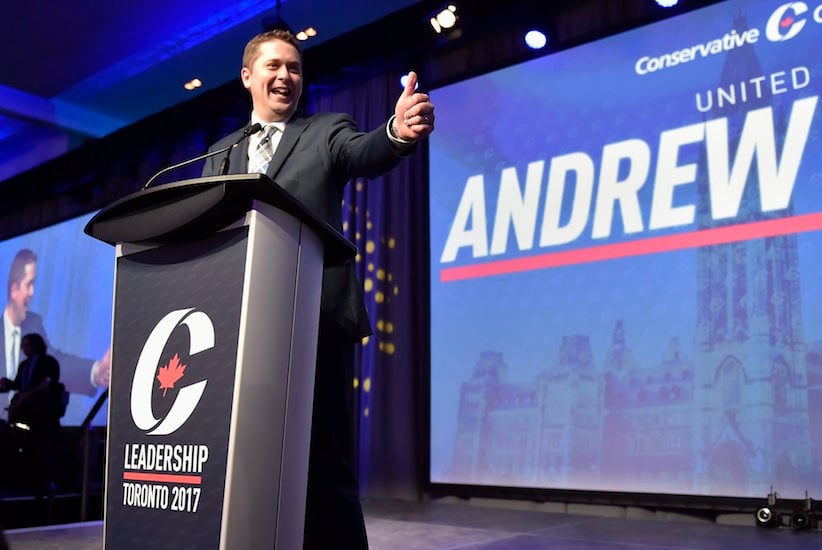Andrew Scheer’s victory speech takes aim at Trudeau
But can he persuade Canadians the Liberals mean “pain and hardship” when the economy looks healthy?
Andrew Scheer speaks after being elected the new leader of the federal Conservative party at the federal Conservative leadership convention in Toronto on Saturday, May 27, 2017. THE CANADIAN PRESS/Frank Gunn
Share

Saskatchewan MP Andrew Scheer used his victory speech at the Conservative leadership convention in Toronto this evening to implore his party to unite behind him, while painting a dark vision of Prime Minister Justin Trudeau’s Liberal government bringing “pain and hardship to Canadians.”
In a clear allusion to the split on the Canadian political right in the 1990s, Scheer said, “We all know what it looks like when Conservatives are divided; we will not let that happen again.” And on Trudeau’s record he declared, “I’m here to tell you that the pain and hardship that the Trudeau liberals are causing Canadians is just temporary.”
That went over big with the Conservative crowd at a convention centre near Pearson International Airport. But Scheer might have his work cut out for him trying to persuade the broad swaths of Canadian voters that the Liberal government is really such a blight. After all, Trudeau rides high in the polls, and just three days ago the Bank of Canada issued a statement on “very strong” economic growth early this year and an “improving labour market”.
Yet Scheer’s speech suggested he is counting on Canadians coming around, sometime before the expected 2019 election, to seeing the Liberals as preoccupied with elite entitlement, rather than making sure the economy delivers jobs and higher incomes. “We are and always will be the party of prosperity not envy,” he said, “the party that always represents taxpayers not connected Ottawa insiders.”
As a low-key former Speaker of the House of Commons, Scheer’s style is about as different from that of the attention-grabbing, photogenic, social-media-dominating Trudeau as it’s possible to imagine. But Scheer tried in his speech, as he did throughout the long Conservative leadership campaign, to cast that as a political virtue.
“Trudeau’s Liberals are so focused on photo-ops and selfies that they don’t care if their policies hurt and not help the middle class,” he said, adding, in a reference to a Trudeau signature phrase, “Sunny ways don’t pay the bills.”
On policy specifics, Scheer mentioned his commitment to balancing budgets and touched briefly on a few specific measures, each aimed at exciting rock-ribbed Conservatives. “The Liberal carbon tax is nothing more than a cash grab,” he said. “I will repeal it.” (Only Ontario MP Michael Chong, who placed fifth in the field of 13 in leadership contest, dared propose a carbon tax to the Conservatives, who often booed him for it during the race.)
Scheer said he would, if he becomes prime minister, withhold federal grants from universities that, in his view, don’t allow free debate—a popular stance among Conservatives who see campuses as rife with “political correctness.” And he vowed to reverse Trudeau’s decision to pull fighter jets out of U.S.-led combat against ISIS in Iraq. He referred to the threat of “radical Islamic terrorism,” a phrase favoured on the political right, but avoided by many politicians in an effort not to offend Muslims.
But the thread that ran through Scheer’s speech was his direct attack on Trudeau, which he explicitly linked to the current prime minister’s father, the late prime minister Pierre Elliott Trudeau. “One of the things that has motivated me so much in this campaign is the very strong belief that I cannot allow Justin Trudeau to do the same thing to my five children that his father did to my generation,” he said.
Stephen Harper, the Conservative leader Scheer now succeeds, once wrote that it was his loathing for Pierre Trudeau, and particularly his 1980 National Energy Policy, that pushed him toward Conservative passions as a young man. Scheer praised Harper from the podium this evening, and many Conservatives saw him as a leadership aspirant who would offer a large degree of continuity with the Harper era.
In his rhetoric in victory, whenever he uttered the name Trudeau, Scheer sounded very much like the voice of an unbroken Conservative obsession.